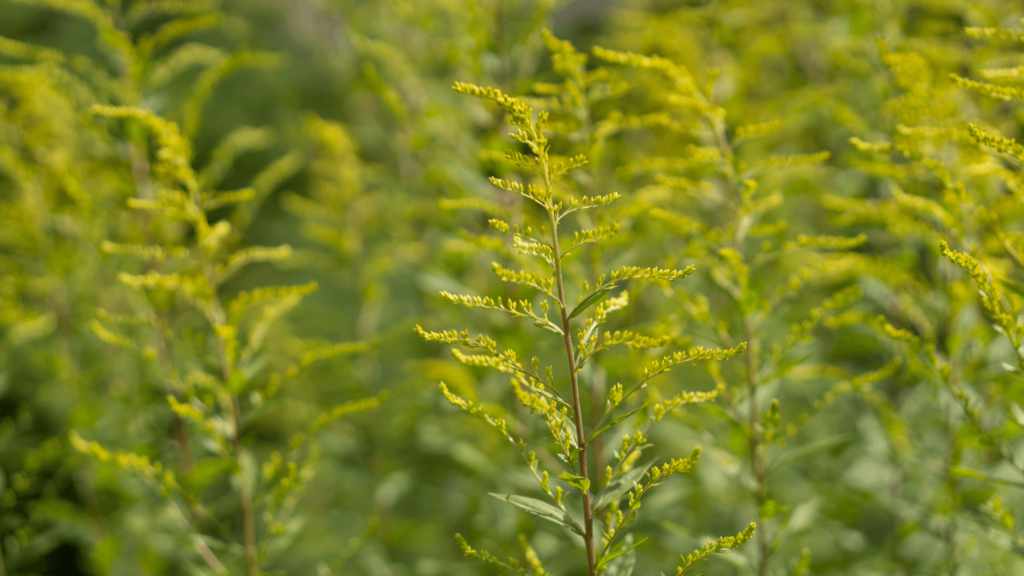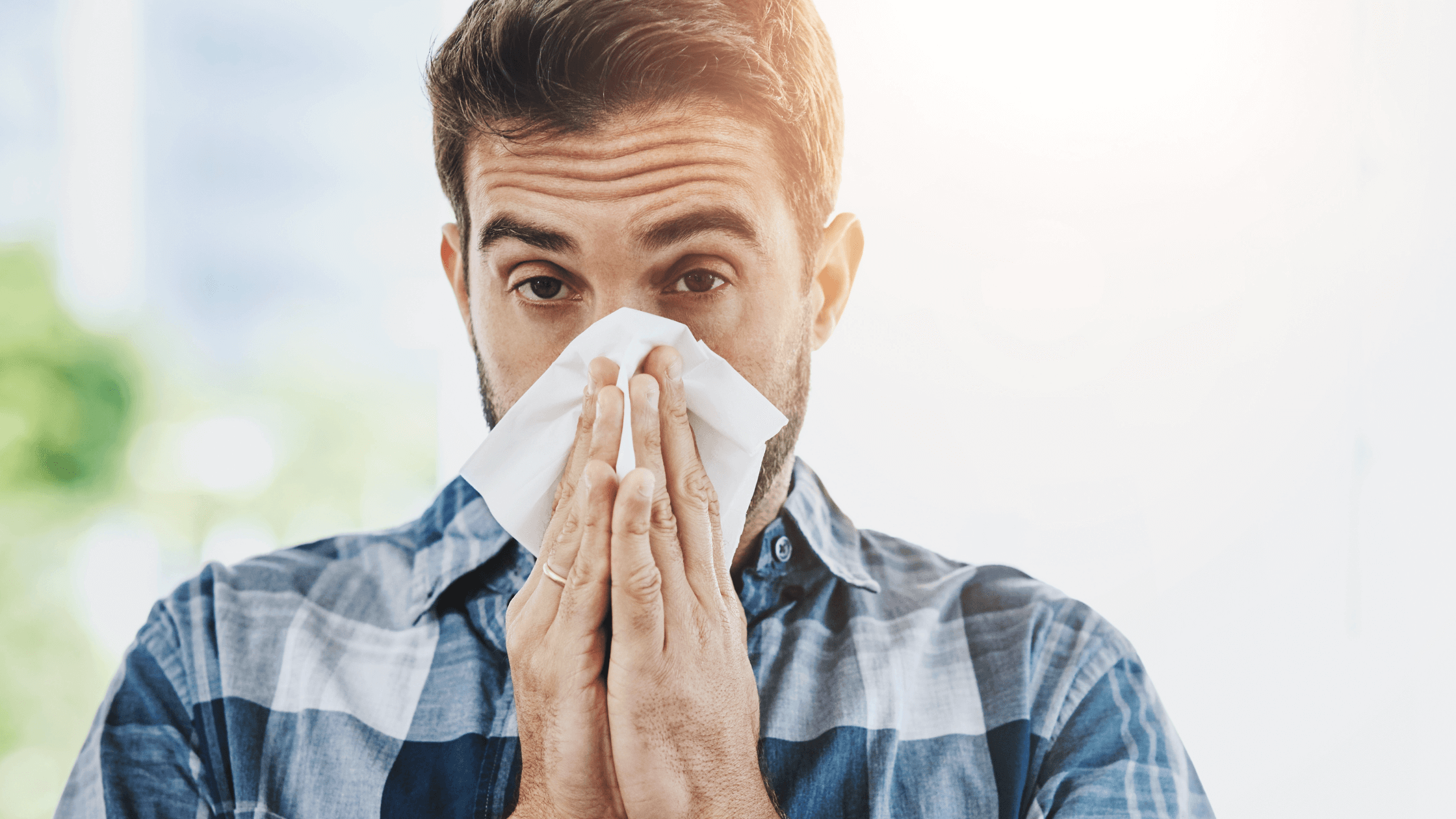If you find yourself struggling with constant sneezing, itchy eyes, or nasal congestion, you’re not alone. Allergies are becoming more common, leaving many searching for relief. Understanding the root causes of your symptoms can help you find ways to ease them. Besides lifestyle changes, natural remedies like quercetin, vitamin C, and stinging nettle can help relieve symptoms.
The basics of allergies
Allergies occur when the immune system overreacts to otherwise harmless substances, like pollen or dust. When allergens enter your body, immunoglobulins (antibodies) such as IgE are released, triggering the release of histamines that cause symptoms like sneezing, congestion, and itching. This immune overreaction is often tied to a heightened sensitivity. Upon initial exposure to an allergen, the immune system creates specific antibodies that ‘remember’ the allergen, causing a faster and more intense reaction upon subsequent exposures.
The immune system produces five types of immunoglobulins, each with a specific role in defending the body:
- IgE: Responsible for allergic reactions, this antibody binds to allergens and triggers the release of histamines from mast cells.
- IgM: The first antibody produced during an initial immune response. It’s primarily responsible for attacking bacteria and is found in blood and lymph fluid.
- IgG: Helps neutralize toxins, viruses, and bacteria, mark them for removal, and activate the body’s defense system.
- IgA: Found in mucosal areas, like the respiratory and digestive tracts, IgA protects against infections.
- IgD: May function as B cell antigen receptors and play a role in B cell maturation, maintenance, activation, silencing, and antigen-triggered lymphocyte differentiation.
Why you’re struggling with allergies

Allergy symptoms can worsen due to various factors, and understanding these triggers can help manage them effectively. Environmental changes, seasonal shifts, climate variations, and lifestyle habits play a significant role in intensifying allergy symptoms.
1. Microbiome imbalance
The health of your gut microbiome plays a vital role in regulating your immune system. Recent research has found that an imbalance in gut bacteria, known as dysbiosis, can worsen allergy symptoms. A well-functioning microbiome helps regulate the body’s immune responses, including reactions to allergens. When the microbiome is out of balance, the immune system may overreact to allergens, intensifying symptoms such as sneezing, congestion, or itching. Maintaining a healthy balance of gut bacteria through probiotics and a fiber-rich diet can also help modulate immune responses and potentially reduce the severity of allergic reactions.
2. Household chemical exposure
Everyday exposure to chemicals in cleaning products, air fresheners, and personal care items can aggravate allergies. Many of these chemicals aren’t allergens themselves but can irritate the respiratory system and worsen existing allergy symptoms. Reducing synthetic chemicals in your home and opting for natural or fragrance-free products (or DIY cleaning products) may help lessen allergy-related discomfort.
3. Environmental changes
Urbanization, increased pollution, and exposure to new allergens can lead to heightened immune responses. Living in areas with higher pollution levels or near industrial zones can worsen allergic reactions, as airborne irritants like dust, chemicals, and exhaust fumes aggravate the immune system, making symptoms more severe.
4. Seasonal changes
As seasons change, so do allergen levels. Pollen from trees, grasses, and weeds peaks at different times of the year, especially in spring and fall. This rise in airborne pollen triggers allergic reactions in those sensitive to it. Seasonal allergies can often feel worse during these times due to increased allergen presence in the air.
5. Climate
Climate change notably impacts the intensity and duration of allergy seasons. Warmer temperatures and fluctuating weather patterns can cause earlier blooms, leading to extended periods of pollen exposure. Regions that experience mild winters may have a longer allergy season, exposing individuals to allergens for more months out of the year.
6. Lifestyle triggers
Daily habits and lifestyle choices can also influence the severity of allergies. For instance, spending more time outdoors when pollen levels are high or maintaining an environment with excessive dust or mold can exacerbate symptoms. Stress, poor diet, and lack of proper sleep also weaken the immune system, making individuals more susceptible to allergic reactions.
Lifestyle changes to provide rapid relief from allergies
Certain lifestyle adjustments can provide quick and effective relief from allergy symptoms. By proactively managing your environment and daily habits, you can reduce exposure to allergens and minimize the severity of your reactions.
1. Use saline

A saline nasal rinse can help clear allergens from the nasal passages, relieving congestion and irritation. Regular rinsing can reduce the overall impact of airborne allergens like pollen and dust.
2. Do a deep clean (remove dust)

Dust can accumulate in carpets, bedding, and curtains, leading to persistent allergy symptoms. A thorough cleaning of your home—particularly in areas where dust collects—can significantly reduce allergen exposure.
Aside from the home, dust levels can also be high in your work environment. If you struggle with allergies at work, consider wearing respiratory protection to prevent inhalation of dust and irritants.
3. Adjust your humidity levels
Keeping indoor humidity levels between 30% and 50% can help prevent the growth of dust mites and mold, both of which are common allergy triggers. Using a dehumidifier in particularly humid climates can be beneficial.
4. Avoid outdoors when pollen is high
During peak allergy seasons, limiting outdoor activities—especially in the morning when pollen counts are highest—can reduce exposure. If you must go outside, wearing a mask can help filter out pollen and other airborne allergens.
Natural antihistamines for quick relief
While traditional over-the-counter allergy medications can be effective, some people prefer to use natural remedies to avoid side effects like drowsiness. Natural antihistamines can reduce histamine levels or calm inflammation, relieving symptoms such as sneezing, congestion, and itchy eyes.
Quercetin
Quercetin is a powerful antioxidant in foods like onions, apples, berries, and grapes. It has been shown to inhibit histamine release, reducing inflammation and allergic reactions. Unlike some other antihistamines, quercetin can be used daily as a preventive measure to help manage symptoms before they start. For best results, combine quercetin with vitamin C or bromelain to enhance absorption.
Vitamin C
Vitamin C is a potent immune booster and acts as a natural antihistamine by blocking histamine production. Studies suggest that taking at least 2 grams of vitamin C daily can help alleviate symptoms of allergic rhinitis, such as sneezing and nasal congestion. It’s easily obtained through diet—citrus fruits, leafy greens, and bell peppers are all excellent sources—or through supplements.
Pro tip: Test to bowel tolerance to avoid digestive issues when taking high doses of supplemental vitamin C.
Bromelain
Bromelain is an enzyme found in pineapples that helps reduce inflammation, making it an effective natural antihistamine for respiratory issues linked to allergies. Research shows that bromelain can help clear mucus and reduce swelling in the nasal passages, particularly when taken with quercetin. It’s available in supplement form for those looking to increase its intake.
Butterbur
Butterbur is another plant-based remedy that has been found to work as effectively as some prescription antihistamines. A 2002 study showed that butterbur can relieve symptoms of allergic rhinitis (hay fever) without causing the drowsiness typical of many allergy medications. However, it’s important to use butterbur supplements free of pyrrolizidine alkaloids (PA), as these can harm the liver.
Stinging nettle
Stinging nettle has long been used to treat allergies, with some studies showing that it can reduce allergy symptoms by blocking histamine receptors. Available as a tea or supplement, it can be a helpful alternative to traditional medications for those looking for a more natural solution.
Probiotics
Probiotics are beneficial bacteria that support gut health, which in turn helps regulate the immune system. Studies indicate that probiotics can reduce allergy symptoms by restoring a healthy balance of bacteria in the gut, which may help lessen the body’s overreaction to allergens.
Bottom line
Allergies can make daily life uncomfortable, but understanding why they occur and how to manage them can help you find relief. From immune responses triggered by environmental factors to lifestyle habits, the causes of allergy flare-ups are varied. Simple lifestyle changes, such as using a saline rinse or reducing indoor dust, can alleviate symptoms. For those looking for natural alternatives to allergy medication, supplements like quercetin, vitamin C, and stinging nettle offer effective antihistamine properties.
However, if symptoms persist or become severe, it’s always a good idea to consult a healthcare provider. A tailored combination of natural remedies and conventional treatments might offer the best relief for those struggling with allergies.


